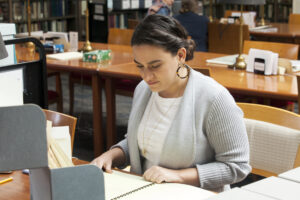 Fellowships at the DC History Center aim to nurture emerging champions and scholars of DC history while encouraging visibility of our connections and collections. Through stipends, dedicated workspace, and mentorship, the Fellowships provide scholars with resources and an intellectual community to develop new research, public outreach, and publications. This is aligned with our mission to deepen understanding of our city’s past to connect, empower, and inspire.
Fellowships at the DC History Center aim to nurture emerging champions and scholars of DC history while encouraging visibility of our connections and collections. Through stipends, dedicated workspace, and mentorship, the Fellowships provide scholars with resources and an intellectual community to develop new research, public outreach, and publications. This is aligned with our mission to deepen understanding of our city’s past to connect, empower, and inspire.
Current opportunities:
2025-2026 Totman Fellowship
Applications are closed.
Current Fellows
Bi’Anncha Andrews, Totman Fellow, Black Washington (2024-2025)
Bi’Anncha Andrews is currently a doctoral student in the Urban and Regional Planning and Design Program at the University of Maryland. Her research will support her exploration of a framework she identifies as “Dispossession by Design,” and examine the deliberate historical design practices which perpetuate policies like segregation, redlining, restrictive covenants, disinvestment, and the devaluation of Black and Brown communities.
Past Fellows
Mariana Barros-Titus, Community Outreach Fellow (2021-2023)
Building on a collaboration established while an undergraduate student at the University of the District of Columbia, Mariana Barros-Titus served as the inaugural Community Outreach Fellow, focused on engagement with DC’s Latino/a/x community.
Tim Kumfer, Totman Fellow, Black Washington (2022-2023)
As a doctoral candidate in the Department of American Studies at the University of Maryland–College Park, Tim Kumfer researched the life and contributions of Josephine Butler (1920-1997), including her role in the DC Statehood movement.
Kristy Li Puma, Totman Fellow, LGBTQ+ DC (2022-2023)
As a doctoral candidate in the Department of American Studies at the University of Maryland–College Park, Kristy Li Puma examines the records and practices of underground queer groups, including Black and Latinx Washingtonians, immigrants, youth, elders, femme people, and artists.
Daniel Ballon-Garst, Totman Fellow, LGBTQ DC (2023-2024)
A doctoral student in Emory University’s Religious Studies program, Daniel studies Black and Latinx queer religious activism, from Stonewall to the early twenty-first century.
Manuel Mendez, Totman Fellow, Black Washington (2023-2024)
A doctoral student in the University of Maryland’s Information studies program, Manuel research explores the DC-specific experience and impact of Arturo Alfonso Schomburg, the late nineteenth and early twentieth-century Afro-Puerto Rican scholar.